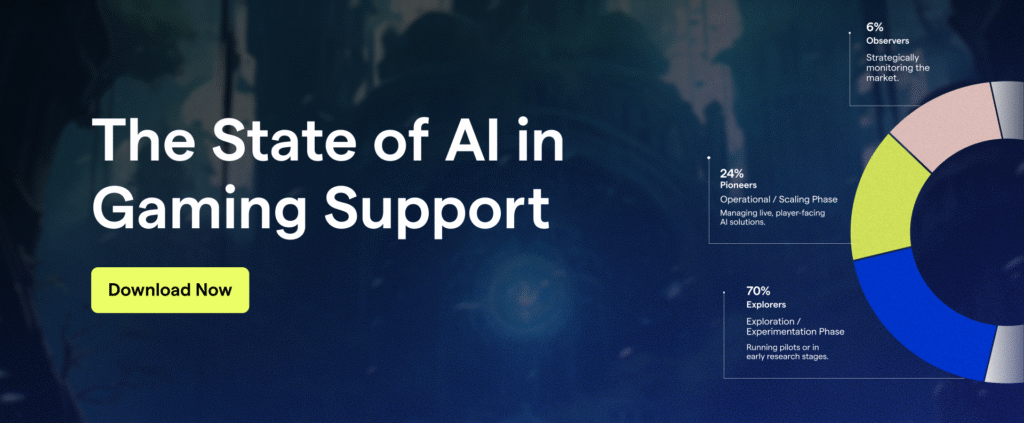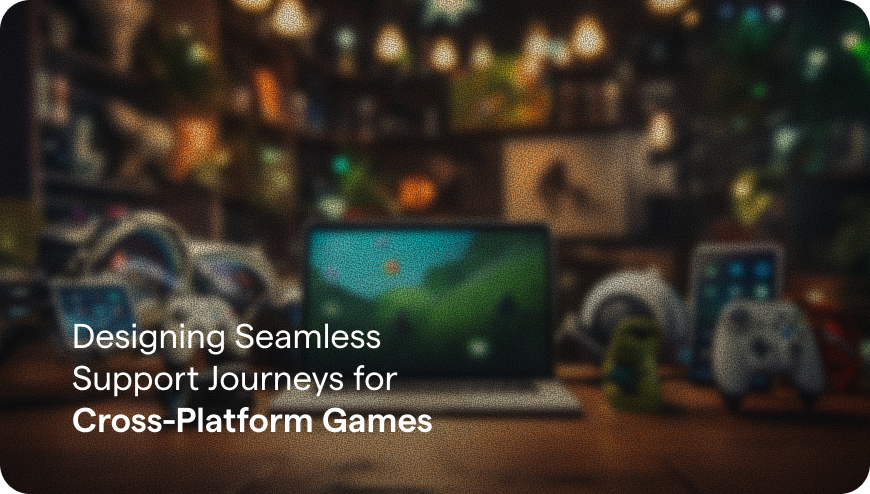It’s 3 a.m. in Tokyo, and a player halfway through a boss battle suddenly loses their inventory. They need help now—not in 24 hours. With over 3.2 billion players worldwide, gaming companies can’t afford delays, language barriers, or clunky support portals.
That’s why top studios are turning to AI-powered support to deliver fast, in-game assistance across time zones and languages—without breaking the gameplay flow. This case study explores how AI is transforming player support into a seamless, real-time experience.
The Global Gaming Support Challenge
Gaming support isn’t like retail or banking. It’s real-time, high-stakes, and deeply immersive. Imagine a player gets disconnected during a ranked match or loses an in-game purchase mid-quest. They want help right away, not a ticket form or a 12-hour wait.
Now scale that urgency across millions of players. A teen in São Paulo might be grinding at midnight, while a commuter in Seoul is gaming on their phone at 7 a.m. Each expects support in their own language, with cultural context, and without ever leaving the game. Studios must balance AI-driven speed with human-like care, resolving everything from login issues to complex bugs quickly. Traditional portals and email queues simply can’t keep up with the pace and expectations of today’s players.
Real-World Implementation: SYBO’s Subway Surfers Transformation
SYBO, the powerhouse behind Subway Surfers—one of the most downloaded games of all time—faced a classic gaming support dilemma. With 150 million monthly players dashing through their game, delivering fast, seamless support wasn’t just important—it was mission-critical.
The problem? Their old email-based system was holding them back.
“Requiring players to exit your game to submit a request via email adversely affects player retention,” said Vlad Oboronko, Player Support Lead at SYBO.
The Challenge
Before adopting AI, SYBO’s support system looked like this:
- Players had to leave the game to send an email when something went wrong.
- Their basic bots barely worked and were eventually turned off.
- Only 10% of tickets were deflected from human agents.
- Response times were slow, and player satisfaction was slipping.
This clunky system clashed with the fast-paced nature of mobile gaming—and it was costing them.
The Solution: AI-First Support with Helpshift
SYBO made the leap to Helpshift’s AI-powered chatbots and in-app messaging, and the change was almost instant:
- Integration took less than 3 months, with only two days needed for SDK implementation.
- The technical team found setup seamless, with no need to overhaul the game experience.
- AI chatbots were placed directly in the game, allowing players to get help without breaking their flow.
The Results? Game-Changing.
SYBO didn’t just improve—they blew past their targets:
- 95% ticket deflection with Subway Surfers’ new support system.
- 85% of support requests now come from in-app messaging instead of email.
- 80% boost in agent productivity, with no new hires.
- $333K in cost savings during the initial rollout.
And perhaps most impressive:
- CSAT score jumped from 3.8 to 4.3.
- Time to First Response dropped by 86% to just 1 hour 40 minutes.
- Automated workflows were so effective, players rated AI support higher than human-only responses.
SYBO’s story shows what happens when gaming studios match their support systems to the pace of their gameplay. With automated issue resolution, human agents can focus on what really matters—delivering meaningful support when things get tricky.
Want support that moves at the speed of your game? SYBO just proved it’s possible.
Multilingual AI: Breaking Down Language Barriers Through Real-World Success
With Subway Surfers played in nearly every country, SYBO needed a way to support millions of players in their native languages—without building a massive multilingual team. Their solution? Helpshift’s AI-powered Language AI, built for real-time translation and cultural fluency.
SYBO integrated machine translation directly into their support flow and saw impressive results:
- 4.45 average CSAT across multiple languages
- Consistent support quality, no matter the region
- Zero need for agents to speak every language
What set their system apart was cultural intelligence. The AI didn’t just translate—it understood gaming slang and regional nuances. A bug report from a player in Mexico reads differently than one from Japan, and the AI adapted accordingly.
Agents received live translations and AI-suggested replies in their own language, while players saw responses in theirs. This enabled:
- Seamless AI-human handoffs
- Fast, natural support conversations
- A huge boost in support team efficiency
SYBO proved that with smart multilingual support, global support doesn’t require hundreds of native-speaking agents. It just requires the right tech built with gamers in mind.
Beyond Gaming: Cross-Industry AI Success Stories
AI-powered support isn’t just revolutionizing gaming—it’s transforming customer experience across industries. Take Red Planet Hotels, one of Asia’s fastest-growing hospitality brands with properties in the Philippines, Indonesia, Thailand, and Japan. To streamline guest communication, they implemented Helpshift’s AI-powered in-app chat system.
“The chat feature on our app helps us interact with our guests more quickly and it’s an easy way for guests to contact us,” said Pawinee Poonyopakorn, Digital Marketing Director at Red Planet. “It improves our hotel review rating as we can promptly solve our guests’ problems.”
Just like in gaming, where seamless in-game support boosts retention, Red Planet found that fast, accessible, AI-enhanced support had a direct impact on player satisfaction and reviews. Their success proves a broader point: instant responses, in-app accessibility, and smart automation aren’t just nice-to-haves—they’re critical drivers of customer experience in any service-focused industry.
For gaming companies, this is a valuable reminder. AI customer service success goes beyond simply deploying new tools. It requires a strategic focus on accessibility, speed, and personalization. The most successful implementations—whether in hospitality or gaming—use AI to remove friction while preserving the personal, high-touch experience players and customers expect.
Performance Analytics and Continuous Improvement: SYBO’s Data-Driven Success
SYBO’s success wasn’t just about automation—it was about visibility. With Helpshift’s advanced analytics and reporting, the team gained deep insight into player needs, support performance, and operational efficiency.
Within the first month, they were able to:
- Track their 95% ticket deflection rate
- See a 7x increase in automation effectiveness compared to their old system
- Identify patterns to continuously refine AI responses and training
This data wasn’t just for reporting. It actively shaped their strategy.
- Bug patterns uncovered through support tickets helped the game team prioritize fixes
- Player feedback gathered from chat interactions influenced live ops decisions
- Support data was no longer siloed—it became part of the game’s continuous improvement loop
Real-time dashboards allowed support managers to:
- Monitor ticket volume and response times
- Predict support spikes based on game updates, in-game events, or regional holidays
- Adjust staffing levels in advance to keep response times fast and consistent
SYBO transformed support from a reactive service function into a proactive driver of engagement and retention. With the right data, they didn’t just answer questions—they improved the entire player experience.
Integration with Gaming Ecosystems
For AI-powered support to truly deliver, it needs more than just clever responses—it needs integration with existing gaming infrastructure. SYBO’s success highlights how connecting AI to systems like player databases, payment platforms, and backend game services unlocks a new level of support personalization.
When a player reaches out, the AI instantly pulls:
- Their player profile
- Recent in-game activity
- Device specs and past support history
This rich context enables the AI to tailor responses to the player’s specific situation—whether it’s helping with a failed purchase, a recurring crash, or a confusing level mechanic. Human agents also receive this full context, so players never have to repeat themselves or re-explain their setup.
But it doesn’t stop at reactive support.
With telemetry and backend access, the AI can offer proactive assistance. For example, if it detects that a player is struggling at the same level due to a known issue, it can reach out with:
- A suggested workaround
- A quick tip
- Or even a goodwill gesture like bonus lives or coins
This level of smart, integrated support turns AI into a true extension of the player experience—helping not just when asked, but when needed most.
Measurable Impact: How AI Support Drives Business Growth
Gaming companies that implement AI-powered customer service are seeing game-changing results across every part of the business. From player satisfaction to support team efficiency, the improvements are both measurable and meaningful.
Key results include:
- 25–40% increase in CSAT scores
Faster response times and more accurate solutions significantly improve how players experience support interactions. - 60–70% reduction in support ticket volume
AI handles routine inquiries automatically, freeing human agents to focus on complex cases that require deeper attention. - Higher player retention and lifetime value
Players who receive timely, effective support are more likely to continue playing, make in-game purchases, and recommend the game to others.
These benefits extend beyond operational efficiency. Improved support leads to stronger player trust and engagement, directly impacting business performance.
Support teams also see major gains. By removing repetitive tasks, AI allows agents to focus on more meaningful work, leading to higher job satisfaction and reduced turnover.
The Future of AI-Powered Gaming Support
AI technology is evolving rapidly, and its ability to understand player behavior and game context is growing more sophisticated. This evolution is helping gaming companies create even more seamless, player-centric support experiences.
Emerging capabilities include:
- Proactive issue detection
AI can identify players who are struggling or encountering bugs and offer solutions before a ticket is ever submitted. - Real-time multilingual support
AI delivers native-quality support in multiple languages, expanding global reach without the need for large language-specific teams. - Predictive staffing and workload planning
AI helps forecast ticket volume based on game updates, events, and regional activity, enabling better resource allocation.
These features show that AI is more than just a tool for handling tickets. It has become a strategic asset that enhances the overall player experience and supports long-term growth.
The takeaway is clear. Studios that adopt AI-powered support are better equipped to meet the high expectations of today’s global players. The question is not whether to implement AI, but how fast gaming companies can integrate it into their support strategy.








